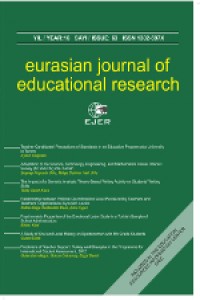Öz
Problem Statement: Trust is crucial for creating a positive culture in the
school environment, which is called as trust culture. On the other hand,
prejudice is thought to be a potential barrier for creating trust culture in
schools. Thus, it is meaningful to examine the relationship between trust
culture and prejudice in schools and then to determine to what extent
prejudices in schools can predict trust culture.
Purpose of the Study: The purpose of this study was to determine the
opinions of teachers and principals working in public primary schools
within Ankara’s central districts on trust culture and prejudice. This study
also examined whether or not prejudices can predict trust culture in
schools.
Method: The study was designed as relational survey model and
performed with mixed methodology in which both qualitative and
quantitative methods were used. Through the stratified sampling
technique, data were collected from 379 teachers from public primary
schools within Ankara’s nine central districts. For data collection, three
scales were developed by the researcher. In data analysis, a t-test was used
to compare participant opinions in terms of the duty and gender variables;
a one-way analysis of variance was conducted to determine whether there
is a significant difference between opinions due to the variables of age,
seniority, educational status, or size of the school. Simple linear regression
analysis was conducted to determine the extent to which prejudices
predict trust culture. α=.05 significance level was set as the basis in significance tests.
Findings and Results: According to the study results, students and parents’ trust relationships are at a better state with classroom teachers than with branch teachers. Older teachers were observed to have better trust relationships with principals than younger teachers. The level of shared goals and values were observed to be higher in small-sized schools than in larger-sized schools. According to the gender variable, male teachers are more prejudiced toward students than female teachers are. No significant differences were detected in terms of the seniority and educational status variables.
Conclusions and Recommendations: One of the most crucial problems that must be considered and tackled in order to enable a trust culture in schools is the prejudice among a school’s shareholders.
Keywords: school culture, organizational trust, teacher prejudices, teachers, work relationships.
Ayrıntılar
| Yazarlar | |
|---|---|
| Yayımlanma Tarihi | 15 Nisan 2016 |
| Yayımlandığı Sayı | Yıl 2016 Cilt: 16 Sayı: 63 |

